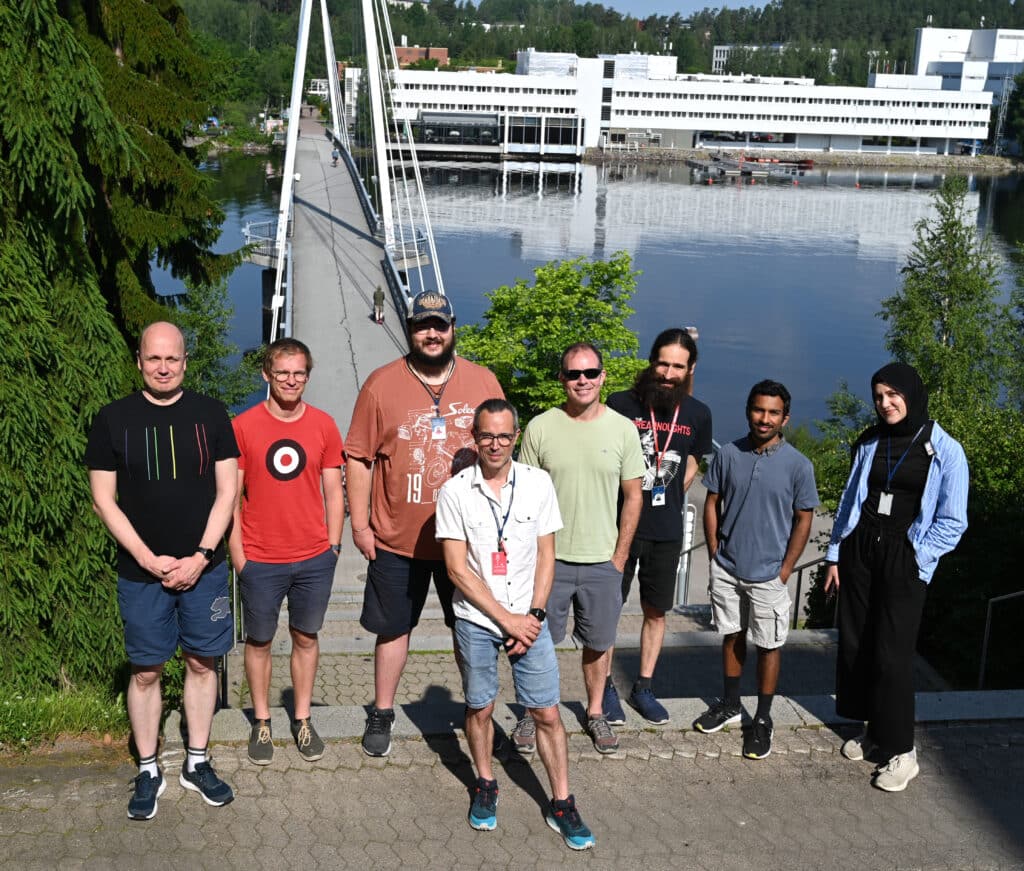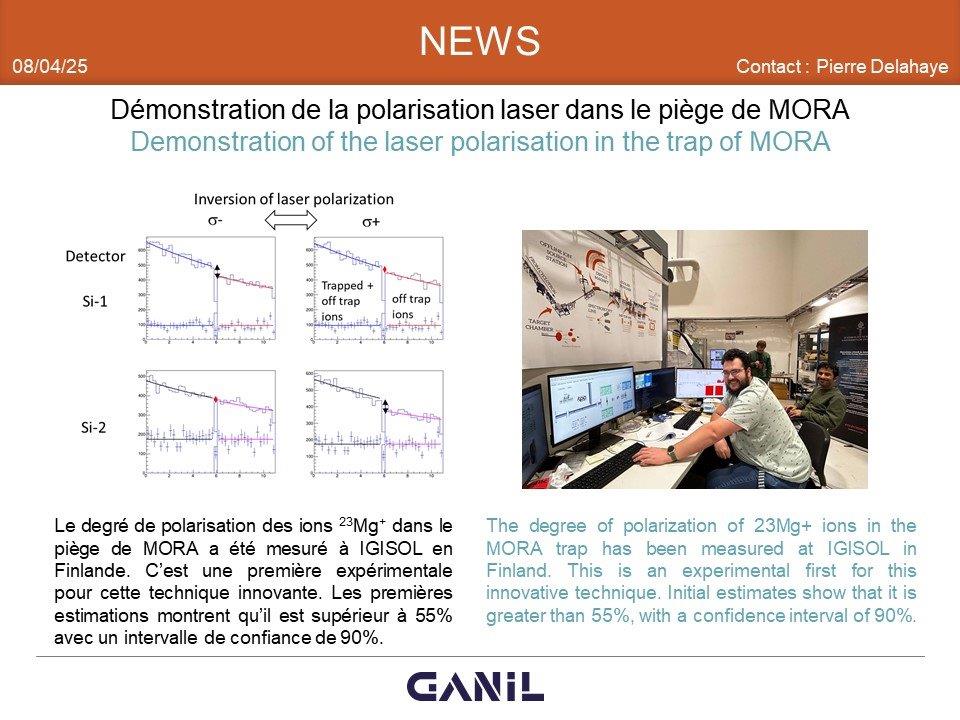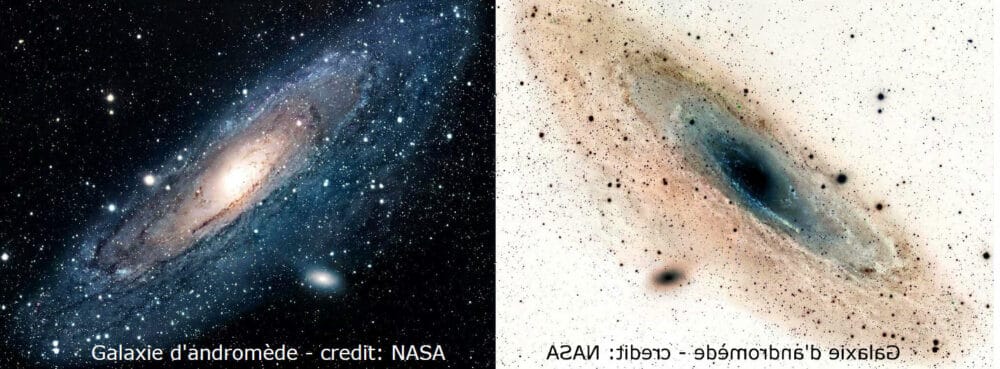Job offers in the frame of the ACCLAIM_MORA project – November 2025
The MORA collaboration at GANIL is pleased to announce two open positions within the ANR-funded project ACCLAIM_MORA:
- One PhD position
- One postdoctoral researcher position
These positions offer a unique opportunity to contribute to high-precision measurements in nuclear physics and to advance our understanding of fundamental symmetries.
PhD Position
The successful candidate will work on the ambitious development of a 39Ca radioactive beam at GANIL, within the Groupe Source d’Ions.
More details about the thesis topic and application procedure can be found here:
PhD Description (PDF)
Postdoctoral Position
The postdoctoral researcher will participate in the analysis of data currently being acquired at the IGISOL facility in Jyväskylä. The work will also involve studying systematic effects related to the transverse polarisation of the ion cloud, combining experimental analysis, theoretical modeling, and numerical simulations.
Full job description and application portal:
Postdoctoral Position – CNRS
Press release for the first measurement of the degree of polarization – October 2025
The article describing the first measurement of the degree of polarization of ions in the trap of MORA, achieved in March, has been published in EPJ A.The proof-of-principle of the innovative technique of polarization is a key milestone for MORA. See also the IN2P3 and GANIL news.
Yield and Beam Purity Milestone Achieved for MORA at IGISOL in Jyväskylä – July 2025
MORA is looking for signs of CP violation in the decay of 23Mg ions—an important step toward understanding the matter–antimatter asymmetry in the Universe.
A key technical challenge has been securing a sufficiently pure beam of 23Mg ions in he MORA trap, previously hindered by significant contamination from 23Na. Overcoming this longstanding issue, the team has achieved a dramatic improvement in beam purity: the 23Mg:23Na ratio has been enhanced from 1:5000 to 1:2.
This breakthrough opens up new opportunities for MORA to pursue its primary goal of detecting CP-violating effects in nuclear beta decay with unprecedented sensitivity.
A photo of the team behind this achievement is shown here.
MORA is led by GANIL, in collaboration with LPC Caen and IJCLab in France, the University of Jyväskylä in Finland—which has hosted the experiment since 2022—and KU Leuven in Belgium.

ANR renews support for MORA through the ACCLAIM_MORA project – July 2025
ACCLAIM_MORA stands for “AdvanCed CaLcium rAdioactive Isotopes Manipulation for MORA”
The ACCLAIM project will open perspectives to look for sources of CP _MORviolation which can explain the matter antimatter assymetry of the universe in the decay of polarized 39Ca ions, complementary to 23Mg.
685 k€ are granted for:
- The development of the 39Ca beam at GANIL (1 PhD)
- The development of a stacking trap at the University of Jyväskylä for beam purification of beams for MORA
- The development of a high intensity buncher in the RFQ cooler developed at LPC Caen for the installation of MORA in the future experimental hall DESIR at GANIL
- The development of a laser polarization setup to control transverse polarization that will be benchmarked at the university of Jyväskylä, and data analysis (1 postdoc 2y)
Confirmation of the polarization proof-of-principle – March 2025
See:
- GANIL NEWS below.
- ArXiv paper (on line 25/04/2025) for details:
- N. Goyal, A. Singh, S. Daumas-Tschopp, L. M. Motilla et al., Performance of the MORA Apparatus for Testing Time-Reversal Invariance in Nuclear Beta Decay, arXiv:2504.16957 [physics.ins-det]

First indicative proof of the laser polarisation technique – July 2024
Technically, MORA employs an innovative alignment method within a transparent Paul trap, combined with laser polarization techniques. A polarization degree close to 100% is expected for trapped 23Mg+ ions after a few laser pulses from a Ti:Sa cavity-based system. The trap’s transparency, optimized numerically, enables the observation of ion decays over a wide solid detection angle.
Laser polarization tests in MORA, as well as β-recoil ion coincidence detection for measuring the D correlation, are conducted at the IGISOL facility at the University of Jyväskylä, which features suitable laser and production systems. Since the early commissioning tests in 2022, a large contamination of the beam by 23Na+ has limited the number of trapped 23Mg+ ions in MORA to <10 per cycle. A recent breakthrough in identifying the cause of the contamination permitted to reach a number of ions of about 200 and to measure for the first time asymmetries on the Si detectors situated on the axis of the trap (see picture below). The difference of asymmetries obtained with opposite laser circular polarization A– – A+= 1.42±0.93 show that the spin of the ions were reverted with 83% CL. Coincidences between βs detected by the phoswiches and recoil ions detected by MCPs in the azimuthal plane of the trap were also recorded for the first time. An upcoming publication is being prepared to present these very first exciting results.

Sketch of the MORA experimental setup
PhD position
Time reversal invariance test in nuclear beta decay: Analysis of the data of MORA at JYFL
Why are we living in a world made of matter?
The “Matter’s Origin from RadioActivity” (MORA) experiment [1] is looking for answers. Appearing in the beta decay spectra of mixed Fermi and Gamow Teller transitions, the so-called D correlation is sensitive to Time reversal violation, and via the CPT theorem, to CP violation. CP violation is one of the three famous Sakharov conditions needed for explaining the matter – antimatter imbalance observed in the Universe [2]. The measurement of the D correlation in the decay of trapped, and laser polarized 23Mg+ and 39Ca+ ions, as proposed in the frame of MORA, complements the search for Electric Dipole Moments to look for new interactions, which can explain the imbalance [3, 4]. The MORA experiment is using an innovative polarization technique, which combines the high efficiency of ion trapping with the one of laser orientation. It is currently taking data using 23Mg+ beams delivered by the IGISOL facility, at the Accelerator Laboratory of the University of Jyväskylä. A problem of beam contamination by stable 23Na+ has so far hampered the measurement. However, recent experimental progress shows that the laser-polarization proof-of-principle is finally within reach. It enables measurements of D to the ~10-4 level, which will be competitive with the best limit obtained so far on a non-zero D correlation in neutron decay [5]. To attain such precision regime, several weeks of data taking are required along the coming years (2025-2027) at Jyväskylä, both for 23Mg+ and 39Ca+ beams. As for every precision measurement aiming at looking for New Physics, the analysis of data has to be undertaken in parallel with data acquisition, in order to control data quality and to investigate systematics effects potentially affecting the sensitivity of the measurement. The data analysis includes crosschecks and adaptation of existing simulations of individual detectors of MORA, performed with GEANT4 and PENELOPE Monte Carlo codes, and pursing the investigation of systematic effects using these simulations. Dissemination of the experimental data at national and international conferences will be part of the objectives of the PhD thesis.
Expected skills:
• Skills in numerical methods and data analysis, statistics
• General interest in developments in fundamental subatomic physics
• Knowledgeable in experimental methods in nuclear or particle physics
• Good communication skills
• Programming (C++/python/others)
Contact:
Pierre Delahaye
Phone: +33 (0)2 31 45 44 56
email: pierre.delahaye@ganil.fr
Address: GANIL, BP 55027, 14076 Caen France
Bibliography
[1] P. Delahaye, E. Liénard, I. Moore, M. Benali, M. L. Bissel, L. Canete, T. Eronen, A. Falkowski, X. Fléchard, M. Gonzalez-Alonso, W. Gins, R. P. D. Groote, A. Jokinen, A. Kankainen, M. Kowalska, N. Lecesne, R. Leroy, Y. Merrer, G. Neyens et al., «The MORA project,» Hyp. Int., vol. 240, p. 63, 2019.
[2] A. D. Sakharov, «Violation of CP invariance, C asymmetry, and baryon asymetry of the universe,» JETP Letters, vol. 5, p. 24, 1967.
[3] A. Falkowski et A. Rodriguez-Sanchez, «On the sensitivity of the D parameter to new physics”, (2022),» Eur. Phys. J. C, vol. 82, p. 1134, 2022.
[4] P. Herczeg et I. B. Khriplovich, «Time-reversal violation in beta decay in the standard model,» Phys. Rev. D, vol. 56, p. 80, 1997.
[5] H. P. Mumm, T. E. Chupp, R. L. Cooper, K. P. Coulter, S. J. Freedman, B. K. Fujikawa, A. Garcia, G. L. Jones, J. S. Nico, A. K. Thompson, C. A. Trull, J. F. Wilkerson et F. E. Wietfeldt, «New Limit on Time-Reversal Violation in Beta Decay,» Phys. Rev. Lett., vol. 107, p. 102301, 2011.
International MORA workshop
An international MORA workshop was held at the University of Jyväskylä in May 2022.
